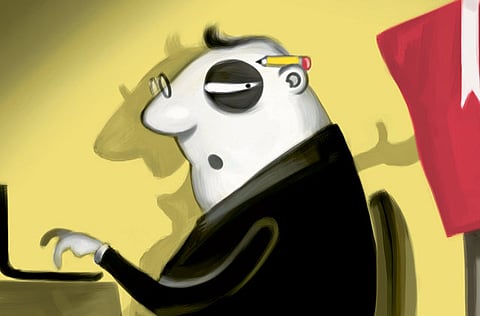Journalists should never compromise on integrity
UAE media professionals need to follow a strict code of ethics in their dealings with public relations agencies to uphold the sanctity of news

The relationship between many journalists and public relations professionals in the UAE has fundamental ethical flaws, according to many participants at a recent conference.
Issues regarding professional ethics were aired at the Middle East Public Relations Association (Mepra) conference held this week at Zayed University in Dubai.
MEPRA is a professional organisation made up of public relations professionals and academics in the region. The group aims to promote best practices in the field while upholding strong ethical standards.
Dr Mohammad Kirat, dean of the Communication Department at the University of Sharjah, presented research showing that corruption among journalists and public relations professionals is quite common in the UAE and the region. He noted that many journalists are quite noble, but that in some newsrooms rampant bribery (both money and gifts) was a "fiasco".
His comments were well received by journalists and public relations practitioners in the audience — most could tell their own stories of routine incidences of bribery or the expectation of bribery.
Incidents went far beyond the culturally accepted practice of presenting small gifts as tokens of appreciation. Kirat and the participants agreed that the most egregious abuses occurred in the Arabic-language press.
Of course, these practices are unethical. A journalist accepting money or a gift in exchange for positive news coverage violates his or her trust with the audience. News audiences expect (or should expect) that journalists operate with their best interests at heart. A story is worthy of coverage because it bene-fits the public in some way — not because of a gift the reporter has received.
Since journalistic bribery is a relatively common practice, some public relations practitioners complained that they have to "play the game" in order to get coverage of their product, company or event. They said that they feel powerless to change the situation.
Participants suggested two solutions to resolve this ethical quandary.
First, journalists and public relations practitioners need to follow their own ethics codes. The UAE's code of ethics in journalism states clearly that "accepting bribery to publish or hide information" is a dangerous professional violation. It also warns against creating bonds with sources that can affect impartial reporting.
Improper influences
MEPRA's code of ethics warns against "deceptive practices" as well as "improper influences" with the media. Furthermore, MEPRA specifically states that gifts to journalists should not exceed Dh180 in value. But attendees reported that some public practitioners gave journalists iPhones while others presented gift vouchers worth hundreds of dirhams.
In order for codes of ethics to work, organisations need to enforce them. Last month, a US newspaper fired its photographer because he electronically altered a picture to make it look better. His actions violated the US journalistic code of ethics that states clearly that journalists should "never distort the content of news photos".
By punishing those violating rules of ethics, organisations help create a culture that respects high standards of behaviour.
I've never seen a report of a journalist in the UAE being fired for an ethical violation. (A representative from a local daily at the event said that the newspaper had indeed quietly fired two business reporters for ethical violations. I remarked that such actions should probably be more public).
MEPRA has publicly reprimanded one of its members for an ethics lapse — an important step towards helping to create a culture that respects proper professional standards.
The second solution is to promote personal integrity. The concept of integrity is universal — my Emirati ethics students tell me the Arabic word is nazahah. In any culture, the word means doing the right thing regardless of others or even if acting in such a manner carries a personal cost.
Personal integrity is important because research shows that group norms can be a powerful influencer of behaviour. Often-times, people ‘go along' with unethical behaviour because they see others doing the same. But if one person stands up and objects, then others may find the courage to voice their own concerns.
Perhaps the culture would change if more practitioners — both in public relations and journalism — would simply voice their uneasiness with the status quo.
Attempting to change an ingrained culture may appear to be too daunting a task to tackle.
However, with enforcement of ethics codes and a commitment to personal integrity, the journalism and public relations professions in the UAE can work together to raise their level of professional standards.
Dr Matt J. Duffy teaches ethics at Zayed University in Abu Dhabi. He co-advises the student chapter of the Society of Professional Journalists, an organisation that promotes strong ethical behaviour in journalism. You can follow him on www.twitter/mattjduffy



